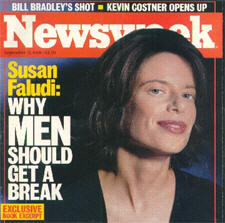 |

 |
|
The Betrayal of the American Man STIFFED: The Betrayal of the American Man by Susan Faludi, Perennial, 2000 softcover $16, 662 pages
"No, no," I laughed, "you've obviously never dated a waiter. People who get Stiffed are those who've been led to believe that an expenditure of effort in one field or another will bring them, at the very least, a tip. But when the gluttonous hog leaving the table neglects to leave a tip, the serviceperson who has been led by custom to expect it is-- stiffed. Cheated." The author of this amazing book is Susan Faludi, one of the finest writers in our times, a Pulitzer Prize winner; a mind easily recognizable as one of the new century's great marvels. For men, the extraordinary reach of her take on the equality of the sexes trumpets what a Newsweek cover explained as : "Men Should Get a Break."Sounds like good news, eh? I'll go along with that sentiment. I just wish that other men could readily do so too. Its usually very difficult for most men (if they're gay or straight makes little difference) to see themselves, as poet Robert Burns put it, as others see them. "It would," Burns wrote, "from many an error free them, and foolish notion." Men struggle--above all things--to give the impression in America's "culture of ornament" (Faludi's term) that they suitably measure up to the changing demands which this culture, currently a product of the corporatocracy, makes on them. Fortunately, Faludi addresses this stinging fact head on. She writes:
Monkey see, monkey do, it seems. Ms. Faludi continues: "Today it is men who cling more tightly to their illusions. They would rather see themselves as battered by feminism than shaped by the larger culture. Feminism can be demonized as just an "unnatural" force trying to wrest men's natural power and control from their grasp. Culture, by contrast, is the whole environment we live in; to acknowledge its sway is to admit that men never had the power they imagined. To say that men are embedded in the culture is to say, by the current standards of masculinity, that they are not men. By casting feminism as the villain that must be defeated to validate the central conceit of modern manhood, men avoid confronting powerful cultural and social expectations that have a lot more to do with their unhappiness than the latest sexual harassment ruling." Men, in their inability to see above the corporate pig pens in which they revel, remind me of animals trapped in a maze whose walls are too tall. Since they're not aware of how much the culture has shaped and influenced their behavior through which they get their daily sense of dissatisfaction, they stop looking upward, altogether unaware they've been trapped. Stiffed reminds them of this uncomfortable fact, however, with a full-fledged flushing out of just how rampant is the blinding role-conditioning of males--and how very troublesome is this conditioning for society, erupting from coast to coast in violence and meyhem. Reading this magnificent book I keep hearing--in a 1965 memory--the voice of Boston's first blueblooded gay activist, Prescott Townsend, whispering in my ear as he did at the ECHO (East Coast Homophile Organizations) conference: "It's the culture we've got to change, the culture!"
But when they grew up and many returned from Vietnam, they weren't welcomed as heroes, in fact, but found that many contemporary women had been wondering, while they were away, if relationships with these men needed to be obligatory. Old-fashioned standards of masculinity demanded that women, after all, obey. Men, wanting to be perceived as totally in control as well as dominant, competitive, strong and violent if necessary, were acting like unwitting would-be-oppressors. Between 1968-1975, while the Vietnamese conflict raged, so did women's consciousness of unwitting male oppression grow. There was a sea change in attitude among women, but, unfortunately, no comparable movement among men Rush Limbaugh later helped popularize the bewildered, socially-conservative male reactionary's stance to women's perceptions by labeling liberationist views "FemiNazism". But the feminists, if they were examining new vistas, were not men's true enemies. Men, because of their outmoded roles, were. "We have met the enemy," as the old saying goes, "and he is ourselves," inflicting sad self-punishment. This same old saying reminds me too of what the gay witch, Dr. Leo Louis Martello, wrote in the original GAY newspaper back in 1969. Promising his readers "the curse that never fails," he unveiled the following words: "I wish you upon yourself." The problem, as Ms. Faludi so capably explains, is that men are blind to the shortcomings in themselves that their culturally-prescribed roles elicit. These shortcomings cause them to be dissatisfied and confused. But such confusion is not men's fault. It's the culture's. Stiffed is by far, I think, the most important social commentary now going. I bought it for myself when it emerged in hardcover, but gave it that same day to Saviz Shafaie, a men's liberationist on the national board of NOMAS, the National Organization for Men Against Sexism. Not until recently did I buy myself the new paperback edition. If you hope to understand yourself and to be aware of other men as well, this book inaugurates a total revolution in consciousness. While it is quite lengthy, it is so clear and gripping that every page, beautifully written, is chock full of a special knowledge and awareness that none of us can afford to be without. |
 © 1997-2002 BEI
© 1997-2002 BEI
 I mentioned this book last week to my old friend Randy. Since it had to do with men
and because it was called Stiffed he assumed that it somehow dealt with
getting erections.
I mentioned this book last week to my old friend Randy. Since it had to do with men
and because it was called Stiffed he assumed that it somehow dealt with
getting erections.
 Susan Faludi
Susan Faludi